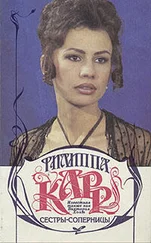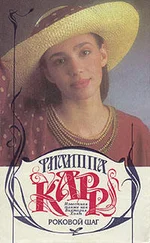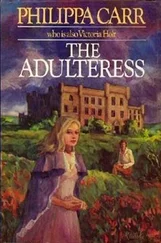She looked at me keenly and I think very soon decided to like me; and I was very pleased that she did.
My mother was effusively complimentary about the house, said that houses fascinated her and that our own had been in the family for generations.
While we were introducing ourselves, there was a patter of feet overhead and the children came down—Fanny hovering in the background.
"Fanny," I cried.
She came hurriedly to me and then stopped. " 'Ello," she said. "So you've come."
"Fanny likes Hampton, don't you, Fanny?" said Timothy.
"It's all right," said Fanny grudgingly.
"Oh, and this is Fiona."
The bright-eyed little girl gave me a smile of welcome.
"And here's Alec."
Alec, a rather tall and gangling youth, shook hands rather awkwardly; and I felt I was going to like Timothy's family. This was quickly confirmed.
Fiona immediately decided that it was her place to look after Rebecca. This greatly pleased her father, and Janet Ransome looked on approvingly.
Janet and Timothy showed us the house from top to bottom: the buttery, the laundry house, the great kitchens with their stone floors, big ovens and roasting spits.
"We don't use these much now," said Janet. "Thank goodness we don't eat the gigantic meals our forefathers did."
We went on our tour of inspection; the hall, the dining room with the delightful linen fold paneling, the long gallery with the portraits of the family, the tapestries on the dining room walls and the chair seats of needlepoint in rich shades of blue worked by some ancestress who had lived more than a hundred years before. There was the crown post room, the attics, and all the bedrooms, many with their four-poster beds which had been in the family for generations.
From the windows were views of the river and the gardens running down to it. There were a few stone steps leading to the water which they called the privy stairs: there were two boats, attached to posts there, in which one could row oneself up and down the river.
From the topmost rooms one could see Hampton Court, the famous palace which had once been Wolsey's before he was compelled to make a present of it to his king.
It was a delightful place.
"I wonder you can bear to leave it," I said to Timothy.
He looked a little sad. I supposed the place was full of memories. This was where he had lived with his wife. From these stables she had gone out one morning and had been carried back to this house on a stretcher—gone forever.
There was a portrait of her in the gallery—a pretty woman with a pleasant smile. I had guessed who she was before I was told.
My mother was delighted with our visit. She thought the place enchanting and the family delightful. I could see that she had decided that I could do far worse than settle down here.
In a few days I was feeling that I knew the house and its inhabitants very well indeed. Rebecca had settled in and her new playmates compensated for the loss of Pedrek. She was delighted with Fiona but I think she was especially fascinated by Fanny.
Fanny was obviously pleased by Rebecca's preference; and when I saw Fanny with my daughter I believed she looked happier than I had ever seen her before.
"I like it here," said Rebecca. "Are we going to live here?"
Her words startled me. I knew my family thought that marriage with Timothy would be the best possible solution for me, and now that I had met Timothy's sister, I was sure that she too was not averse to the idea. Her home was in this house and she had been mistress of it, but I could see that kind of authority did not mean a great deal to her. She was absolutely devoted to Timothy and she firmly believed that he needed to marry again to enable him to recover from that devastating blow which the death of his wife had obviously dealt him.
I had not realized until I came to the house how deeply he had suffered and still was suffering, I believed. In my heart I guessed that no one could ever take the place of his first love, the mother of his children. But it would not surprise me if he asked me to marry him.
We went riding together. It was the only way to be by ourselves without interruption from some member of the family. I was not exactly taken aback when he pulled up his horse and suggested that we walk a little. He took my arm and we went down to the brink of the river.
It was November, but warm for the time of the year, and the bluish mist gave an air of mystery to the river and the big houses on the other side.
He said: "I expect you know what I am going to say, Angelet? It has been in my mind some time. Will you marry me?"
I hesitated.
He went on: "I love you, you know. I felt drawn to you from the moment we met and when you went chasing Fanny I was in such a state of panic and I saw how lonely I should be if I lost you."
"Marriage is too serious a step to rush into," I said.
"I agree. I have thought a lot about this. Have you?"
"I haven't thought of marriage. I am not sure that I want to ... yet."
"Of course, we have not known each other very long, but we have been through some adventures together. When I saw how you cared about Fanny ..."
"You cared very much, too. You have brought her here."
"Yes, I do care about her. I think we could have a good life together."
"Perhaps," I said.
"I can see no reason why not. We know each other well. I admire you so much. The children are already fond of you. So is Janet. Rebecca has settled in. Your mother feels friendly towards me. It seems to me that it would be ideal."
"Yes, it would be ideal from their point of view. But there is more to it than that, Tim. I think you are still in love with your wife."
"She has been dead a long time."
"She is the one ... she will always be the one."
"I can care for you, too. And you? You remember your husband. He must have been a wonderful character ... just as my wife was. We were both lucky in our marriages ... until we lost them, and both violently. That in itself draws us together. We can't go on mourning all our lives, Angelet."
"No," I said. "But I am not sure yet, Tim."
"That means you want more time to think."
"Perhaps I do. You haven't forgotten her ... and I ..."
"You mean we both really love someone else more ..."
I nodded.
"It is hard to live up to the hero Gervaise was."
I did not answer. When I had agreed that we each loved someone more I was not thinking of Gervaise, but of Ben which was absurd. I had an obsession with the man. He was continually cropping up in my thoughts. I was a fool to go on thinking of him. I should take this offer. It was second best for both of us. Surely it was a unique situation. I could wean him from his regrets for the loss of his wife; he would show me that there was no hope of a happy future for me while I thought of Ben.
It was sensible. It was reasonable. I contemplated the life we should have together in this gracious house. We could make a happy future for Fanny and the children. He would be a good and kind father for Rebecca. Our families approved. We would continue with our work at the Mission. I was a fool to turn away from it.
But I had not turned away. I knew that I would be foolish to. I saw so clearly that Timothy and I could make a good life together. But I wanted time to think ... time to come face to face with myself and this obsession with Ben. How could I be so foolish? There was a man who had married for the sake of gold, who was ruthless, determined to succeed. How could such a man be capable of the love and devotion I could expect from Timothy? Besides, Ben was married.
I knew them both well enough to know that I could find a quiet and peaceful happiness with Timothy and nothing but storm and stress from Ben. Ben's passion would be fierce. I did believe that he loved me, but he loved gold ... and power more. Timothy loved me, too, but he loved his first wife more. In time, Timothy and I could grow close together; I was sure of that; we could lay the ghosts of the past to rest ... perhaps. But can one ever compete with the dead?
Читать дальше







